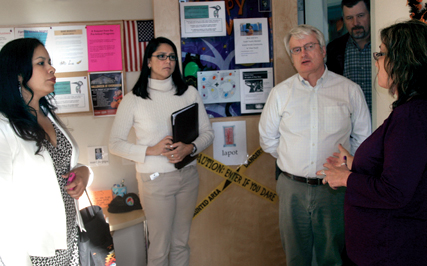Culture
Tribe receives two ANA grants for language classes, transition house

The Confederated Tribes of Grand Ronde received two Administration for Native Americans grants totaling more than $1.4 million that will fund a kindergarten-first grade Chinuk Wawa immersion project and a women's post-treatment transition house and youth prevention effort.
The Tribe received a three-year, $759,622 grant that will create a half-day blended kindergarten-first grade immersion classroom.
The grant will fund the Chinuk Wawa immersion kindergarten during the first year of the grant while developing curriculum for a blended kindergarten-first grade, which will be implemented during the second and third years of the grant.
"Our goal is to preserve the language and create new speakers when they are best able to learn," the Tribe's application stated. "The Tribe has created an immersion preschool and kindergarten, but students go into public school without immersion and are losing their language skills."
The Tribe will provide $189,906 in matching funds (largely from in-kind staff time) over the three-year grant period.
The Tribe also received a two-year, $652,984 grant that has two objectives. One will help fund a transitional house for women. The second objective will expand youth activities largely through the new youth addition.
The grant includes furnishings and equipment for the youth addition, now nearing completion, and for the women's transition house. Both of those construction projects already have received U.S. Housing and Urban Development Indian Community Development Block Grants, but those awards don't provide furnishings or equipment.
The effort will combat increased use of meth, marijuana and cocaine in the Tribal community. It also will target an increase in teenage pregnancy.
"The Tribe needs a women's transition house for women coming out of treatment and the Tribe needs more activities for youth to help prevent initial use of drugs and associated risky behavioral problems," the Tribe's grant application states.
The Tribe will provide $163,247 in matching funds (again largely from in-kind staff time) over the two-year life of the grant.
The language immersion effort will be led by the Tribe's Education Department working with Cultural Resources staff while Behavioral Health will operate the women's transition house with support from Social Services.
The Administration for Native Americans was established under the Native American Programs Act of 1974 and provides discretionary and competitive grant funding to assist in the planning, development and implementation of short-term, community based projects that result in social and economic benefits supporting healthy children, families and communities.
Tribal Planning and Grants Manager Kim Rogers said the Tribe also has received an $88,188 Department of Justice grant to help fund furnishings, equipment and renovation costs for the transition house, as well as a $263,696 Tribal Personal Responsibility Education Program grant from the Administration for Children and Families to combat teen pregnancy.
The latter grant will last four years and the second through fourth years are expected to be about $130,000 a year.
